
Over nine years we’ve tracked the universities feeding the legal profession.
-
76.5% of trainees at the leading 130+ firms are Oxbridge and Russell Group graduates
-
London universities topple Oxbridge for graduate earnings in law
-
Non-law graduates earn 6% more than law grads
-
Regional firms prefer regional universities
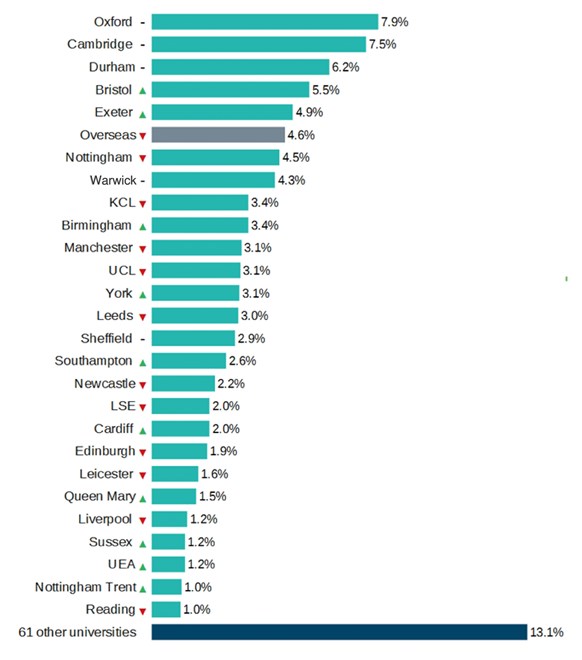
Sal Francis Morton, 5 July 2019
It’s up there with correcting your friend’s pronunciation of quinoa or pretending you’ve never heard of Lidl – producing a ranking of lawyers’ favourite universities is an expression of middle class Britain par excellence. And our big discovery is that... very little has changed in a decade. In nine years, law firms’ appetite for Oxbridge and Russell Group students has remained pretty much constant. We could stop our investigation right here: the law is demanding, intellectually rigorous and it needs capable graduates – see graph. But there are new discoveries, and questions you should ask, like what this tells us about the firms, what your prospects are and who your colleagues will be, and then deeper concerns arise about social mobility in the law.
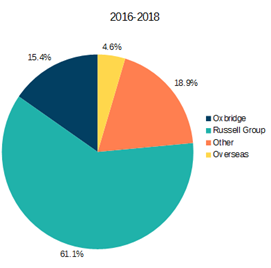
We interviewed over 2,500 trainees for our True Picture reviews over the past three years and recorded the university where each one of them completed their undergraduate degree. We then combined this with our data all the way back to 2010, when most of the current Chambers Student research team were still gamboling about the school field in PE kit (kidding, we’re more the library type). Find more on our methodology, plus a few disclaimers at the bottom of this page.
Oxbridging the gap
Although Oxbridge students make up less than 1% of each year’s graduating class, they made up a whopping 15.4% of all our trainee lawyer interviewees. This is no surprise given the dominance of the duo in academia.
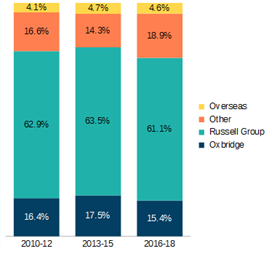
The Russell Group (including Oxbridge) supplied 76.5% of trainee lawyers. That seems big – and it is – but it’s down 5% from our previous survey of the years 2013-2015, although over nine years we’ve witnessed a 3% drop in the Russell Group’s dominance.
Rather than instantly concluding Russell Group unis are ‘better’ for getting a training contract, it’s worth noting top unis are often the ones pumping out larger numbers of law students. So don’t fret if you’re at a uni outside the RG – there were fewer training contract applicants.
Our interviewees came from a total of 88 universities over the past three years. That’s up from 85 in our 2013-2015 research and from 76 in our 2010-2012 research. Over this period our sample size has increased along with the likelihood of new names entering. So we can’t conclude that the law firms have hired from a more diverse range of universities: whatever progress has happened beyond the Russell Group, it’s not significant.
The annual beauty contest
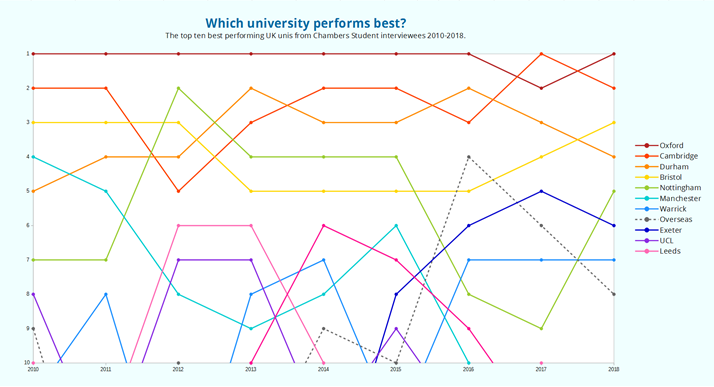
Over the nine years, Oxford and Cambridge dominate training contract recruitment with some consistency, followed by Durham, Bristol and Nottingham. The further down you go, the more erratic it becomes.
Other notable unis that don’t make it into our frontrunners graph are Birmingham, Sheffield and Newcastle, who all appear in the top 20 every single year. Below is a chart of the top 20 most common universities that cropped up in our research over the past nine years.
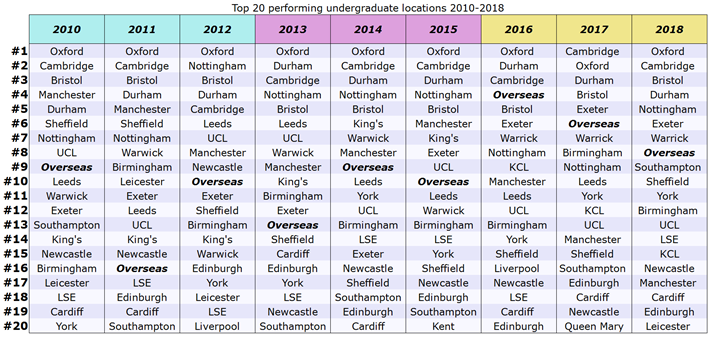
Note the success of LSE which makes it onto the table every year but one. Also worth mentioning are Southampton, Edinburgh and Cardiff, which appear almost every year too. The latter two are the only universities outside of England to rank at all. The pair both took around 2% each of the 2016-2018 trainee sample.
A breeze from overseas
The fortunes of overseas undergrads in our survey is interesting, in particular how they beat every UK university in the salaries table. The sudden jump in numbers between 2015 and 2016 may be due to sponsored work visas being given changes that made it easier for businesses to take on international juniors. And then the drop off after 2016 coincided with changes to student visas in the UK that made it more difficult to be an international student doing the LPC. It’s important to remember that this line isn’t people from overseas, it’s just people who conducted their undergrad not in the UK. To find out about qualifying as a lawyer from overseas, read on>>
Types of law firm and their preferred universities
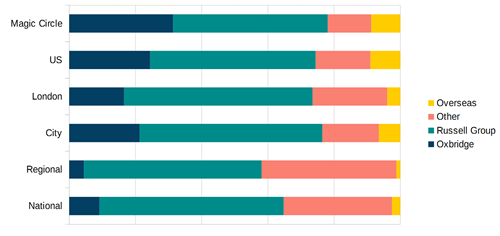
Definitions of firm types:
City (above including the magic circle and US firms): firms focused on City business sectors, such as finance, capital markets, corporate transactions, investment, insurance, energy. E.g. Travers Smith, Herbert Smith Freehills
London refers to firms that are London-based and dealing with mid-sized organisations usually doing anything other than global corporate finance – sectors like IP, media, real estate, human rights, employment, personal injury, public law. E.g. Fladgate, Bristows, Simkins
Regional defines a firm that, you guessed it, has offices inregions that aren’t London, and a head office that’s also somewhere not-London. E.g. Freeths, Cripps, Threthowans, Ashfords
National defines a firm that has strong regional presence as well as a head office or strong presence in London. E.g. DLA Piper, Eversheds, Shoosmiths, Trowers & Hamlins
US is pretty obvious except in cases where there was a transatlantic merger; we’d still consider Hogan Lovells, NRF and BCLP City firms because of their strong London origins.
Magic circle – if you haven’t heard this term before, welcome to the UK legal market, here’s a primer.
The City firms
London is a global legal hub only rivalled by New York. The prestige, the career opportunities, the money and the city itself combine to attract the brightest, hungriest graduates. But the highest salaries in the business and top-notch commercial work also demand stamina and an appetite for long hours and hard work more than any other city in Europe.
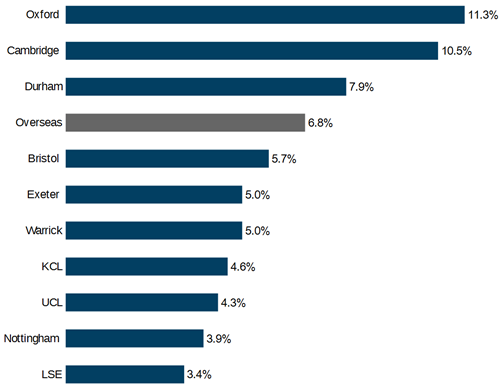
A natural target for go-getters London may be, but there’s a mutual attraction going on. Prestigious law firms lock their gaze on graduates from these prestigious universities, knowing they don’t have to look far for the brightest and most driven candidates. Since employability is a factor in a university’s status and funding, this is a convenient relationship for both the firms and the universities, so it’s hard to break.
In three years the number of Oxbridge grads taken on by City firms has dipped by 2.5%. We also found that London attracted the highest proportion of overseas graduates.
Outside the capital
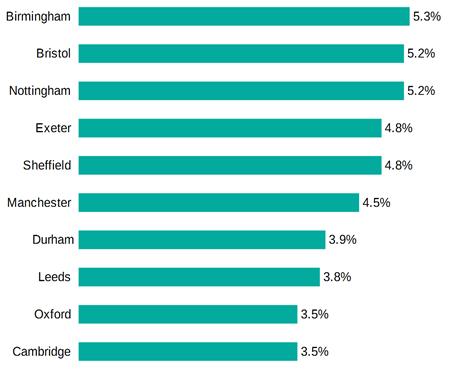
When we leave London, we find Oxbridge only coming in at ninth and tenth on the chart. Durham has taken a slide too. When we look at what replaces Doxbridge, we see universities in big cities with legal markets significant enough to keep graduates hanging around. Oxford, Cambridge and definitely Durham don’t have big legal markets. The trope explained above – that in the eyes of the more prestige-obsessed graduate, London is the be-all and end-all – is visible here.
City vs non-City
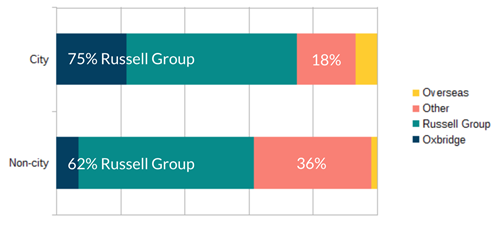
Non-city firms are pulling in trainees from a wider array of universities. 80 universities were mentioned by non-City trainees compared to just 67 mentioned by their City counterparts. City firms are either more selective, or targeted more heavily by Russell Group students.
When we overlay the two graphs, City and non-City, on top of each other, we see regional firms showing less of a penchant for any particular university.
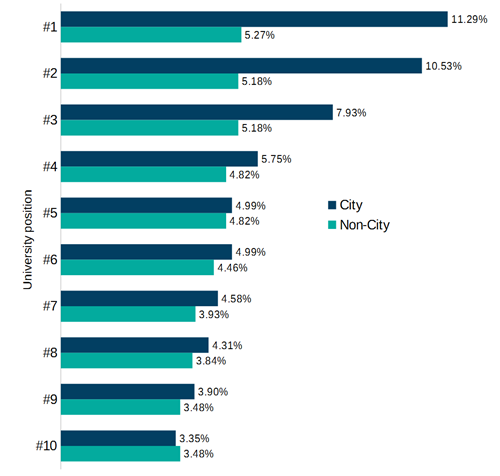
Out of all the Oxford and Cambridge graduates we interviewed, over 80% bagged a contract at a City firm. The university superduo dominated the US and magic circle firms in particular: 24% of all US firm trainees and 31% of all magic circle trainees hailed from an Oxbridge undergrad background. A second group comprising Bristol, Nottingham and Durham made up 16% of all trainees in our research. Both Notts grads and Bristolians showed a pretty even split between city and non-city firms, but Durham grads showed an almost 75% preference for working in the city.
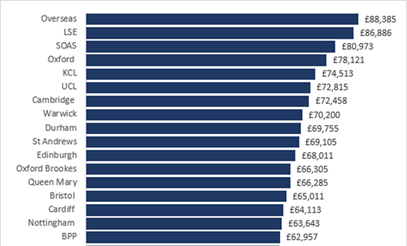 NQuids in
NQuids in
The university you attend does determine your employability and earning power, but prestige isn’t everything, as a glance at this table below will show. Here we plotted university background against eventual NQ earnings. Any universities missing didn't produce strong enough data. Learn more about this study here.
To law or not to law?
If you’re wondering whether to do an LLB or a non-law degree then GDL, your answer may lie below.
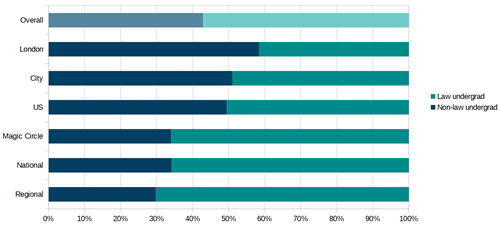
We wouldn’t recommend making life choices based only on these figures, though. At most firms you’ll meet a balance of law and non-law grads. All legal teams work best with the variety of perspectives both groups bring.
The graph above implies there’s a difference in average earnings between law and non-law grads, so we crunched the numbers and found this: the average NQ salary for non-law students is £72,551, 6% higher than the average NQ salary earned by law grads: £68,406. This might reassure the non-law grads that they’re not starting their careers on the back foot, and should certainly encourage wavering GDL applicants. But otherwise, the best advice we can give is to study a subject you care about – career success is about passion, not playing a numbers game.
My university isn’t mentioned at all
There were over 107 UK universities mentioned in our data from 2010-2018. If your university doesn’t rank highly in our report, should you be concerned? We know that anyone can become a lawyer, regardless of where they completed their undergraduate degree. Clearly some universities will give you an advantage, but it’s worth remembering that there are three main variables to anyone’s employability: the value of your education; your personal experience; and your character. Throughout your education each of these three elements will develop the other two – it’s what employers mean by ‘well-rounded’. The other vital ingredient is to make good decisions at every stage, and that where we come in: use our guidance and market intelligence to help you understand where you’d find your niche in this giant profession.
This study will point to issues about social mobility in the law. The link between ‘prestigious’ institutions and ‘prestigious’ careers is difficult to challenge. Those who argue that both university admissions and law firm hiring is meritocratic should take a look at our School Backgrounds of Trainees report, which showed that an undeniable bias towards privately educated graduates exists in the profession.
Thankfully many of the most elite firms are focusing much energy on addressing this bias, with programmes like contextual recruiting, and unconscious bias and diversity training. We meet many law firms at far-flung universities and can see the efforts they make to get in front of a diverse student group. It’s encouraging, but as we can see from nine years of tracking this data, progress is happening slowly.
Methodology and disclaimers
- We interviewed a sample of 7000 (exactly!) from the 139 firms featured in our guide since 2010. Since our last report in 2016, we've interviewed 2,500 trainees.
- Over three years, we have interviewed roughly 20% of all trainees in England and Wales.
- Participating firms represent the more competitive half of the market: combined their trainee vacancies amount to over 2,500, which is over half all trainee positions going each year.
- We have only looked at undergraduate degrees for the purposes of this study.
- This survey doesn’t account for the numbers graduating from each institution. For example, Manchester and Nottingham’s undergrad enrolments are much higher than that of St Andrews’. This will skew the results in favour of the larger, less specialist institutions.
- The subject that was studied can influence how a university appears. For example, Leicester runs a very well-regarded law degree, and so has a strong showing. Imperial College, meanwhile, concentrates heavily on science and technology subjects and so naturally features less prominently. But that doesn't mean, say, an Imperial chemistry graduate would be less likely to get a training contract than a Nottingham geography graduate.